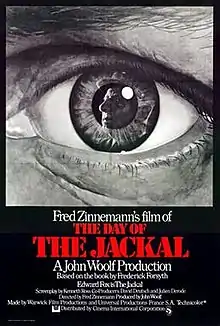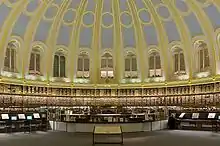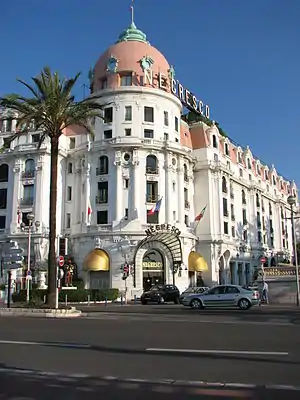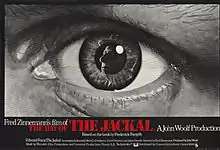The Day of the Jackal (film)
The Day of the Jackal is a 1973 political thriller film directed by Fred Zinnemann and starring Edward Fox and Michael Lonsdale. Based on the 1971 novel of the same name by Frederick Forsyth, the film is about a professional assassin known only as the "Jackal" who is hired to assassinate French president Charles de Gaulle in the summer of 1963.[2]
| The Day of the Jackal | |
|---|---|
 Theatrical release poster | |
| Directed by | Fred Zinnemann |
| Produced by | John Woolf |
| Screenplay by | Kenneth Ross |
| Based on | The Day of the Jackal by Frederick Forsyth |
| Starring | |
| Music by | Georges Delerue[1] |
| Cinematography | Jean Tournier |
| Edited by | Ralph Kemplen |
Production company | |
| Distributed by | Universal Pictures |
Release date | 16 May 1973 |
Running time | 142 minutes |
| Country |
|
| Language | English |
| Box office | $16,056,255 |
The Day of the Jackal received positive reviews and went on to win the BAFTA Award for Best Editing (Ralph Kemplen), five additional BAFTA Award nominations, two Golden Globe Award nominations, and one Oscar nomination. The film grossed $16,056,255 at the box office,[3] and earned an additional $8,525,000 in North American rentals.[4] The British Film Institute ranked it the 74th greatest British film of the 20th century.[5]
A remake, The Jackal, was released on 14 November 1997 in US and 8 January 1998 in UK, which starred Bruce Willis, Richard Gere and Sidney Poitier.
Plot
On 22 August 1962, an assassination attempt is made on French President Charles de Gaulle by the militant underground organisation OAS which is infuriated at the French government granting independence to Algeria. As the president's motorcade passes, de Gaulle's unarmoured Citroën DS car is raked with machine-gun fire, but the entire entourage escapes without injury. Within six months, OAS leader Jean Bastien-Thiry and several other members of the plot are captured, and Bastien-Thiry is executed.
The remaining OAS leaders, now hiding in Austria, decide to make another attempt and hire a professional British assassin, who chooses the code name "Jackal". They order several bank robberies to pay his fee of $500,000. Meanwhile, the Jackal travels to Genoa and commissions a custom-made rifle from a gunsmith and fake identity papers from a forger. He kills the forger when the man tries to blackmail him. In Paris, the Jackal sneaks an impression of the key to a flat that overlooks the Place du 18 juin 1940.
In Rome, where the OAS team have moved, members of the French Action Service kidnap the OAS's chief clerk, Viktor Wolenski. Wolenski dies under interrogation, but not before the agents have extracted some information about the plot, including the word "Jackal". The Interior Minister convenes a secret cabinet meeting of the heads of the French security forces. When asked to provide his best detective, Police Commissioner Berthier recommends his deputy, Claude Lebel. Soon afterwards, Lebel is given special emergency powers to conduct his investigation, which is complicated by de Gaulle's refusal to change his planned public appearances.
Colonel St. Clair, a personal military aide to de Gaulle and one of the cabinet members, discloses what the government knows to his mistress Denise through pillow talk - unaware that she is an OAS agent who passes this information on to her contact which aids the Jackal, and allows him to avoid capture on several occasions. Meanwhile, Lebel determines that British suspect Charles Calthrop may be travelling under the name Paul Oliver Duggan, who died as a child, and has entered France.
Although he is told that the authorities know about the plot, the Jackal determines that he will succeed nonetheless. He seduces the aristocratic Colette de Montpellier at a hotel, and warned by his contact, leaves just before Lebel and his men arrive. After a vehicular accident that nearly kills him, the Jackal steals a local car and drives to Madame de Montpellier's country estate for somewhere to stay. However, he kills her after sleeping with her again and discovering that the police have talked to her. The Jackal then assumes the identity of a bespectacled Danish schoolteacher named Per Lundquist, whose passport he had previously stolen in London. Disposing of Duggan's belongings in a river, he drives to the railway station in Madame de Montpellier's car and catches a train for Paris.
After Madame de Montpellier's body is discovered and her car recovered at the railway station, Lebel is no longer hindered by secrecy requirements, and begins a public manhunt for the Jackal as a murderer. The Jackal picks up a man at a Turkish bathhouse and is taken to the man's flat. The next day, the Jackal kills his host after the man learns from a television broadcast that "Lundquist" is wanted for murder.
At a meeting with the Interior Minister's cabinet, Lebel states his belief that the Jackal will attempt to shoot de Gaulle three days later on 25 August, the day commemorating the liberation of Paris during World War II. Later, Lebel plays a recording of a phone call, in which Denise gives information to her OAS contact. St. Clair apologises for his indiscretion and leaves the meeting. Denise returns to St. Clair's apartment to find that he has killed himself and that the police are waiting for her.
On Liberation Day, the Jackal, disguised as an elderly veteran amputee, enters the building whose key he had earlier sneaked. After rendering unconscious the building’s concierge with a blow to the back of the neck, he assembles his rifle and waits at a window in an upper apartment. When Lebel finds out a policeman allowed a one-legged man with crutches to pass through the cordon, the two race to the building. As de Gaulle presents the first medal, the Jackal shoots, but misses when the tall president suddenly leans down to kiss the recipient on the cheek. Lebel and the policeman burst in. The Jackal shoots the policeman, but Lebel kills him using the cop's submachine gun.
The Jackal is buried in an unmarked grave, with Lebel as the only witness. While searching Charles Calthrop's flat, the police are confronted by the real Calthrop, who insists on accompanying them to Scotland Yard. He is later cleared, leading Inspector Thomas to ask, "But if the Jackal wasn't Calthrop, then who the hell was he?"
Cast
- Edward Fox as the Jackal, also known as Paul Duggan & Per Lundquist
- Michael Lonsdale as Deputy Commissioner Claude Lebel
- Terence Alexander as Lloyd
- Michel Auclair as Colonel Rolland
- Alan Badel as the Minister
- Tony Britton as Inspector Thomas
- Derek Jacobi as Caron
- Denis Carey as Casson
- Cyril Cusack as the Gunsmith
- Maurice Denham as General Colbert
- Delphine Seyrig as Colette de Montpellier
- Jacques François as Pascal
- Olga Georges-Picot as Denise
- Raymond Gérôme as Flavigny
- Barrie Ingham as St. Clair
- Jean Martin as Victor Wolenski
- Ronald Pickup as the Forger
- Vernon Dobtcheff as the Interrogator
- Eric Porter as Col. Rodin
- Anton Rodgers as Jules Bernard
- Donald Sinden as Mallinson
- Jean Sorel as Jean Bastien-Thiry
- David Swift as Montclair
- Timothy West as Commissioner Berthier
- Bernard Archard as Inspector Hughes
- Philippe Léotard as Paris Gendarme
- Edward Hardwicke as Charles Calthrop
- Adrien Cayla-Legrand as President Charles de Gaulle
- Howard Vernon as Minister Levesque (uncredited)
- David Kernan as the real Per Lindquist (uncredited)
- Féodor Atkine as an OAS member (uncredited)
Production
The Day of the Jackal was originally part of a two-picture deal between John Woolf and Fred Zinnemann, the other being an adaptation of the play Abelard and Heloise by Ronald Millar.[6] Although the story takes place in 1962 and 1963, the film shows car models whose production began later, for example the Peugeot 504 (built from 1968), Renault 12 (built from 1969), a Fiat 128 (1969), and an orange Volkswagen Bus, around 1973.
Zinnemann wrote that Adrien Cayla-Legrand, the actor who played de Gaulle, was mistaken by several Parisians for the real de Gaulle during filming—though de Gaulle had been dead for two years prior to the film's release. The sequence was filmed during a real parade, leading to confusion; the crowd (many of whom were unaware that a film was being shot) mistook the actors portraying police officers for real officers, and many tried to help them arrest the "suspects" they were apprehending in the crowd.


The Day of the Jackal was filmed in studios and on location in France, Britain, Italy and Austria.[7] Zinnemann was able to film in locations usually denied to filmmakers—such as inside the Ministry of the Interior—due in large part to French producer Julien Derode's skill in dealing with authorities.[7] Nevertheless, the opening sequence was not shot in the Élysée courtyard but at the hôtel de Soubise, main office of the French National Archives. The two palaces were both built at the beginning of the 18th century, but the Hôtel de Soubise is more accessible and has less security than the Élysée.
During the massive annual 14 July parade down the Champs-Élysées, the company was allowed to film inside the police lines, capturing extraordinary closeup footage of the massing of troops, tanks, and artillery during the final Liberation Day sequence. During the weekend of 15 August, the Paris police cleared a very busy square of all traffic to film additional scenes.[7][8]
Frederick Forsyth later wrote that for the film contract to buy rights for his novel, he was offered two options: £17,500 plus a small percentage of subsequent film profits, or £20,000 and no royalties. He took £20,000, noting that such a payment was already a massive sum to him, but due to his naivety about finances he waived rights to a small fortune in royalties given the film's enduring success.[9]
List of locations
| Location | Sequence |
|---|---|
| 150 Rue de Rennes, Paris 6, France | Assassination sequence |
| Archives nationales, Hôtel de Soubise, 60 rue des Francs-Bourgeois, Paris 3 | As the Élysée Palace |
| Boulevard de la Reine, Versailles, France | Bank, as "Banque de Grenoble", in fact a savings bank |
| Boulevard des Batignolles, Paris 17 | OAS contacts Denise |
| British Museum, Great Russell Street, Bloomsbury, London, England | The Jackal reads Le Figaro |
| Champs-Élysées, Paris 8 | Military parade |
| Château du Saussay, Ballancourt-sur-Essonne, Essonne, France | Madame Colette de Montpellier's chateau |
| Entrevaux, Alpes-de-Haute-Provence, France | The Jackal drives by toward Paris |
| French Riviera, Alpes-Maritimes, France | |
| Gare d'Austerlitz, Place Valhubert, Quai d'Austerlitz, Paris 13 | |
| Great Russell Street, Bloomsbury, London | |
| Hôtel de Beauveau, Place Beauvau, Paris 8 | Ministry of Interior |
| Hotel Colombia, Genoa, Liguria, Italy | |
| Hotel Negresco, 37 Promenade des Anglais, Nice, Alpes-Maritimes, France | Jackal learns that his cover is blown |
| Imperia, Liguria, Italy | |
| La Bastide de Tourtour, Tourtour, Var, France | Hotel where the Jackal meets Colette |
| Limousin, France | |
| Piazza San Silvestro, Rome | Wolenski in the real central Post Office |
| Pinewood Studios, Iver Heath, Buckinghamshire, England | Studio |
| Place Charles Michels, Paris 15 | Van attacked |
| Place du 18 juin 1940, Paris 6 | Final assassination sequence |
| Place Vauban, Paris 7 | Biker stops to place phone call |
| Prater Park, Vienna, Austria | Rendezvous with OAS heads |
| Quai d'Austerlitz, Paris 13 | |
| Rue du Faubourg Saint-Honoré, Paris | Outside the Palais de l'Élysée |
| Scotland Yard, Whitehall, London | UK police |
| Somerset House, Strand, London | The Jackal obtains a birth certificate |
| St. James's Park, London | |
| Studios de Boulogne, avenue Jean-Baptiste Clément, Boulogne-Billancourt, France | Studio |
| Ventimiglia, Liguria, Italy | Before crossing the border into France |
| Veynes, Hautes-Alpes, France | Train station, as Tulle station |
| Via di Panico, Rome | Kidnapping of Wolenski |
| Victoria Embankment, Westminster, London | UK police |
Reception
Critical response

The film received positive reviews, with an 89% rating on Rotten Tomatoes from 27 reviews.[10] Among those who praised the film was Roger Ebert of the Chicago Sun-Times, who gave it his highest rating of four stars, writing:
I wasn't prepared for how good it really is: it's not just a suspense classic, but a beautifully executed example of filmmaking. It's put together like a fine watch. The screenplay meticulously assembles an incredible array of material, and then Zinnemann choreographs it so that the story — complicated as it is — unfolds in almost documentary starkness.[11]
Ebert concluded, "Zinnemann has mastered every detail ... There are some words you hesitate to use in a review, because they sound so much like advertising copy, but in this case I can truthfully say that the movie is spellbinding."[11] Ebert included the film at No. 7 on his list of the Top 10 films of the year for 1973.[12]
Box office
The film grossed $16,056,255 at the box office[3] earning North American rentals of $8,525,000.[4] Zinnemann was pleased with the film's reception at the box office, telling an interviewer in 1993, "The idea that excited me was to make a suspense film where everybody knew the end - that de Gaulle was not killed. In spite of knowing the end, would the audience sit still? And it turned out that they did, just as the readers of the book did."[13]
Awards and nominations
| Award | Category | Nominee(s) | Result |
|---|---|---|---|
| Academy Awards, 1974[14] | Best Film Editing | Ralph Kemplen | Nominated |
| BAFTA Awards, 1974[14] | Best Film Editing | Ralph Kemplen | Won |
| Best Film | Nominated | ||
| Best Direction | Fred Zinnemann | Nominated | |
| Best Screenplay | Kenneth Ross | Nominated | |
| Best Sound Track | Nicholas Stevenson, Bob Allen | Nominated | |
| Best Supporting Actor | Michael Lonsdale | Nominated | |
| Best Supporting Actress | Delphine Seyrig | Nominated | |
| Golden Globe Awards, 1974[14] | Best Director | Fred Zinnemann | Nominated |
| Best Motion Picture, Drama | Nominated | ||
| Best Screenplay | Kenneth Ross | Nominated |
Subsequent films
The film was the inspiration for the 1997 American remake film The Jackal, featuring Richard Gere, Bruce Willis, Sidney Poitier and Jack Black. The 1997 film is about an assassin nicknamed The Jackal who wants to assassinate a highly significant target, but other than that, it has little in common with the original story. Frederick Forsyth refused to allow his name to be used in connection with it, and director Fred Zinnemann fought with the studio to ensure that the new film did not share the first film's title.
In 1988, the same plot inspired the Malayalam movie August 1.
See also
Trivia
- Ronald Pickup, who played the forger, is later cast as a professor in The Fourth Protocol, another adaptation of a Forsyth novel.
References
- "The Day of the Jackal". British Film Institute. Archived from the original on 11 July 2012. Retrieved 26 January 2015.
- Lockhart, Freda Bruce (20 July 1973). "Unpretentious perfectionist". Catholic Herald. Retrieved 16 March 2013.
- "The Day of the Jackal, Box Office Information". The Numbers. Retrieved 1 June 2012.
- "Big Rental Films of 1973". Variety: 19. 9 January 1974.
- British Film Institute - Top 100 British Films (1999). Retrieved 27 October 2017
- "Film of Abelard and Heloise". The Times. 9 March 1971.
- Nixon, Rob. "The Day of the Jackal (1973)". Turner Classic Movies. Retrieved 16 March 2013.
- "The Day of the Jackal film locations". Movie Locations. Retrieved 16 March 2013.
- Forsyth, Frederick (2015). The Outsider: My Life in Intrigue. NY: Putnam
- "The Day of the Jackal". Rotten Tomatoes. Retrieved 26 January 2015.
- Ebert, Roger (30 July 1973). "The Day of the Jackal". Chicago Sun-Times. Retrieved 16 March 2013.
- "Ten Best Lists by Gene Siskel and Roger Ebert". Inner Mind. Retrieved 16 March 2013.
- Arthur Nolletti, ed. (1999). The Films of Fred Zinnemann: Critical Perspectives. Albany: State University of New York. p. 20. ISBN 9780791442265. Retrieved 16 March 2013.
- "The Day of the Jackal: Awards". The New York Times. Retrieved 26 January 2015.